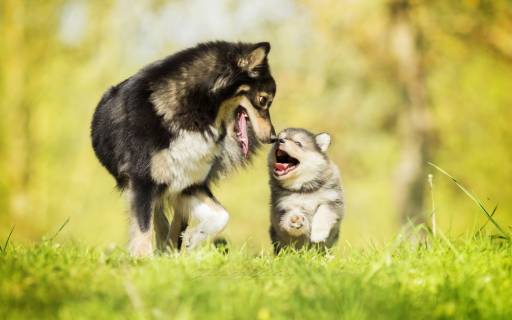Connect with a verified veterinarian in minutes. Licensed vets are available 24/7 to answer your questions. No need to worry about your furry family member.
When a female dog gives birth to puppies, it’s a beautiful experience to watch her start to care for them. But what about male dogs? Some male dogs do help rear their puppies; however, this is not the norm. There are even male dogs that eat their puppies. But what causes this behavior?
We’ve put together some information on what may cause a male dog to eat his puppies. This is a disturbing experience when you see this happening. But is there anything you can do about it? Let’s get started.
Why Do Male Dogs Eat their Puppies?
Most male dogs do not eat their puppies or kill them. In some cases, the male dog may eat their puppies for a couple of different reasons.
For one thing, the male may eat the puppies to make the female go into heat earlier. They may do this if there’s a problem with not having access to enough food and water. However, the male dog may kill his puppies for no apparent reason.
What Can You Do to Keep the Male Dog from Eating His Puppies?
The first thing you can do is not allow the male dog to be near the mother dog and her puppies. The mother dog is focused on caring for her puppies, and anything or anyone that disturbs her can make her upset. The mother, in that case, may even kill her own puppies. So, it’s best to keep the male away from the mother and puppies.
Another problem is that the male dog may become jealous of all the attention the mother and puppies receive from everyone in the house. He may even view his puppies as unwanted competition for attention from their mother, especially if the male and female have a close relationship. He may then kill or eat his own puppies.
Once the puppies are weaned, at about three weeks of age, you may consider slowly allowing the male dog to interact with the mother and her puppies. For one thing, the father could inadvertently injure the puppies by trying to play with them right after birth. And you want to avoid the mother becoming aggressive with the father because he’s near the puppies. Remember, her entire focus is on the care and rearing of her puppies.
So, for these reasons, it’s best to keep the male dog away from his puppies until the puppies have been completely weaned and are large enough to roughhouse safely with their father!
Connect with a verified veterinarian in minutes. Licensed vets are available 24/7 to answer your questions. No need to worry about your furry family member.

Julie
Julie is a graduate of the University of North Carolina, Wilmington, where she studied Animal science. Though contrary to the opinion of her parents she was meant to study pharmacy, but she was in love with animals especially cats. Julie currently works in an animal research institute (NGO) in California and loves spending quality time with her little cat. She has the passion for making research about animals, how they survive, their way of life among others and publishes it. Julie is also happily married with two kids.
Review symptoms, medications & behavior to keep your pets healthy with a Vet Online in just minutes.
Ask a Vet Live Now

